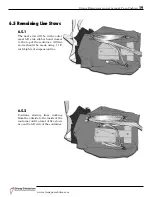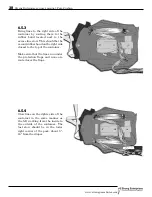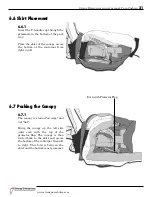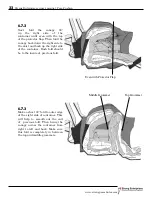
7
Strong Enterprises owner’s manual. Para-Cushion
www.strongparachutes.com
over tighten the straps once you are seated. Fold and stow the webbing ends in the elastic keepers.
Be sure the ripcord handle is securely stowed, yet accessible.
1.11 Plan Ahead
Be prepared in the event of an emergency situation. Know and rehearse your emergency
procedures before they are needed. With the parachute on, sit in your cockpit and fasten your lap
and shoulder belts. Be certain these are over your parachute harness. Wear gloves, helmet and
goggles, even headphones if you normally use them. Mentally organize your bailout procedure.
Inspect your cockpit for projections or sharp edges that may damage the parachute, or injure you.
Consider canopy ejection, oxygen disconnect, or other requirements that you may be faced with.
All these things take time, and an emergency leaves you little time for errors. Generally, you are
better off staying with the aircraft if it is controllable. However, your margin of safety is reduced
as time passes evaluating your situation. With time many situations can get worse. Make your
decision quickly because all these actions consume altitude.
1.12 How to Get Out of the Aircraft
There are only two steps to remember when you must leave your aircraft. 1) Get clear of the
aircraft, 2) then pull your ripcord, in that order. If the parachute begins to open while you’re still
aboard, the wind may inflate it, dragging you out or into the tail. Also, it may entangle with the
aircraft. There are no other rules - the aircraft may be tumbling, spinning, or inverted. Simply
get yourself out any way you can. Clear the aircraft and pull your ripcord immediately. There is
enough oxygen to breath and you’ll be descending into denser air.
1.13 How to Open Your Parachute
The ripcord handle is located near the chest strap on the wearer’s left front of the harness. The
key is to:
LOOK at the ripcord handle, rather than fumble or tug on a harness fitting. Beneath the fabric
cover, the ripcord handle is held in place by a pocket. Look at it first because it may have been
dislodged by your exit.
REACH over and grab it with both hands (typically with your right hand and left thumb), and
PULL! This is no time to be gentle!
If the ripcord doesn’t come free on the first pull, check to make sure it is the handle in your hand,
not some other piece of hardware. Back the handle up to the housing to create slack in the cable,
then punch it out again. The entire cable assembly should come completely out of the housing.
To reduce the pull force, push the handle in the direction that the protective ripcord housing
points - rather than straight out from your chest. The ripcord housing on the Para-Cushion Wedge
model 311 comes over your shoulder, so push the handle down toward your feet. By having both
hands together on the handle, you also reduce the chance of the canopy or lines entangling with an
extended limb. Keep your feet together for the same reason. Body position is secondary to pulling.
Remember to LOOK-REACH-PULL.








































